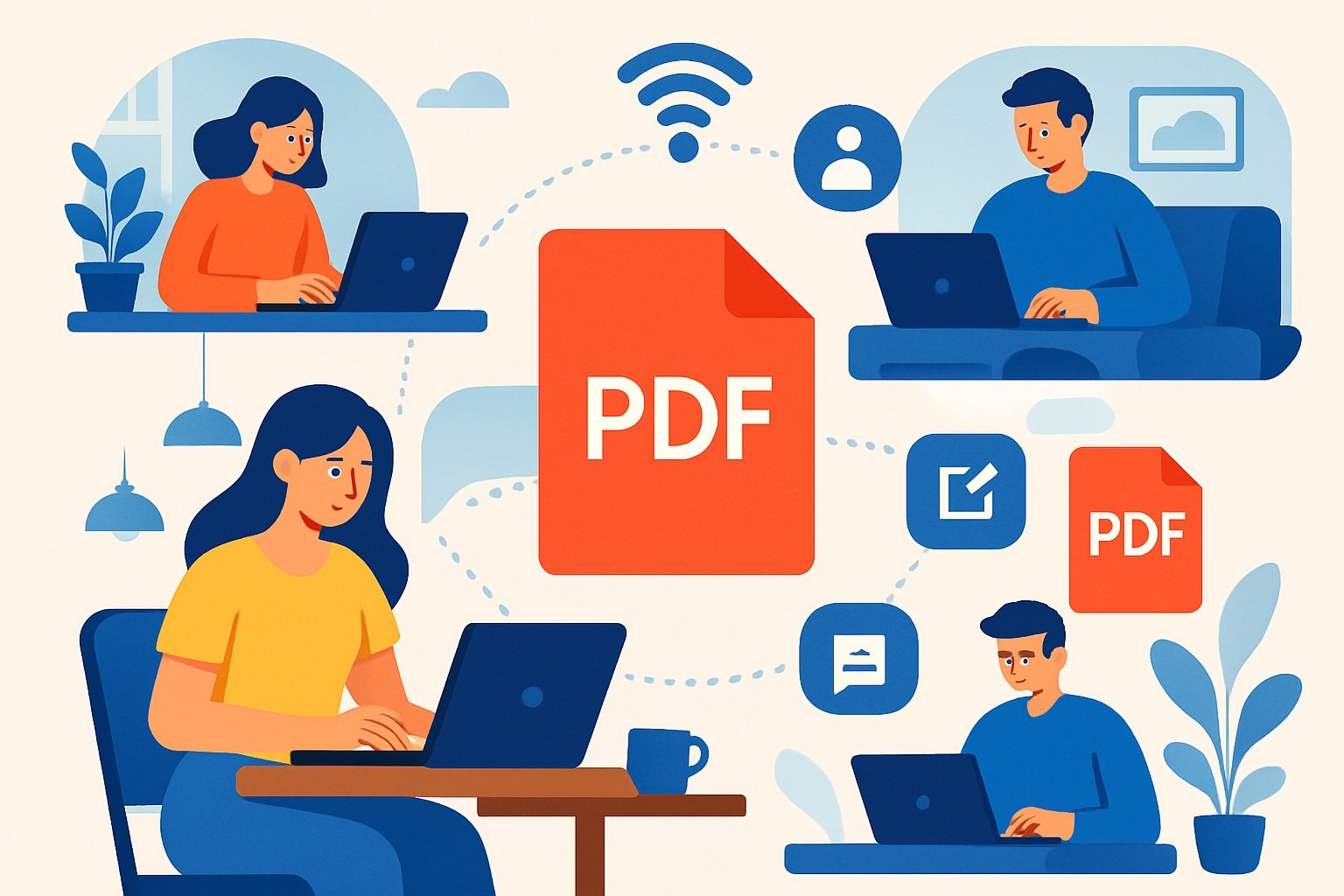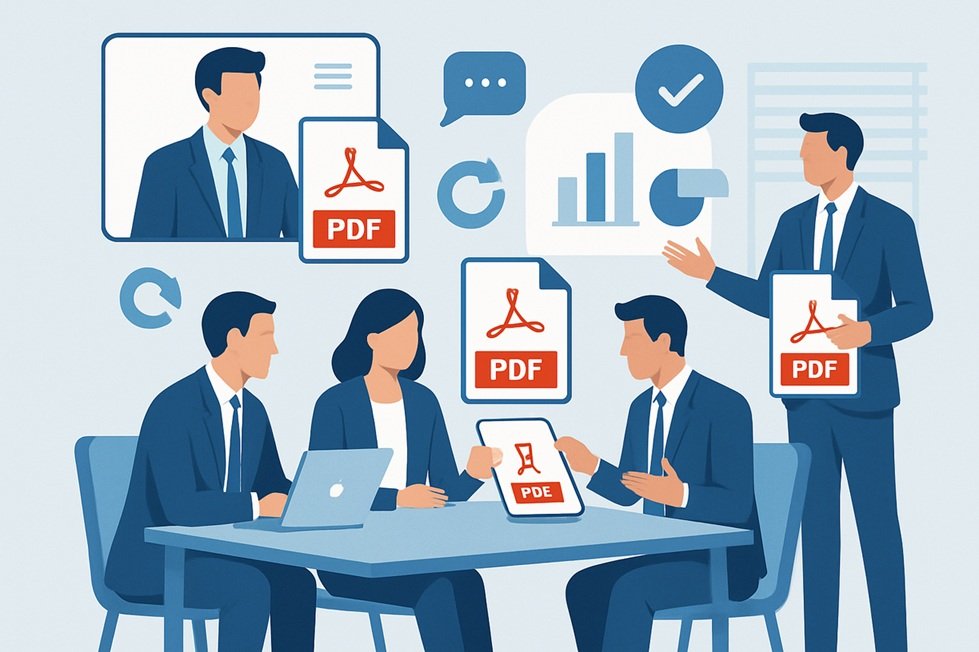Introduction
The rise of remote work and digital offices has transformed how teams collaborate, communicate, and manage information. In this new digital-first environment, the PDF (Portable Document Format) has emerged as one of the most essential file formats for maintaining clarity, consistency, and security in remote workflows.
Whether you're working from a home office, a coworking space, or halfway across the world, PDFs ensure that your documents remain professional, accessible, and secure—no matter the device, location, or internet speed.
Why PDFs Matter More Than Ever
Remote work depends heavily on file sharing, virtual collaboration, and paperless processes. That’s where PDFs shine. Unlike Word documents or spreadsheets, which can break formatting or require specific software to open correctly, PDFs offer universal compatibility and preserve your original layout.
They’ve become the go-to file format for distributed teams, freelancers, startups, and large enterprises alike.
1. Streamlined Workflows for Distributed Teams
One of the biggest challenges of remote work is keeping document workflows consistent and streamlined. Teams use PDFs to:
- 🗂️ Standardize reports, invoices, contracts, and proposals
- 🔁 Reduce friction in approvals and reviews
- ⚙️ Integrate easily with platforms like Google Drive, Dropbox, Notion, and Slack
Because PDFs are non-editable by default, they eliminate the back-and-forth issues of multiple people accidentally changing content. This makes them ideal for final versions of documents, official communications, and client-facing deliverables.
💡 Bonus: You can use Forever PDF to merge, split, or convert documents in real time — no software needed.
2. Access on Any Device, Anytime
Remote workers often switch between devices — desktops, tablets, laptops, smartphones. PDFs ensure that files are displayed consistently across all screen sizes and operating systems.
Benefits of cross-device functionality include:
- 📲 Optimized readability on mobile and tablets
- 💻 No need for proprietary software
- 📩 Small file sizes, ideal for email or chat-based sharing
- 🌐 Works in any browser — Chrome, Safari, Firefox, Edge
Whether you’re working from an iPad on a train or a Chromebook in a café, PDFs give you confidence that your document will look exactly as intended.
3. Digital Signatures for Paperless Agreements
One of the most powerful features of the PDF format is support for electronic and digital signatures. In a remote environment, this eliminates the need for printers, scanners, or physical mailing.
With PDFs, teams can:
- 🖊️ Sign contracts and proposals from any location
- 🤝 Collect legally binding signatures from clients and partners
- 🗂️ Keep audit trails and timestamps for compliance
- ✅ Ensure integrity using certificate-based encryption
PDF-based e-signatures are now accepted globally in legal, financial, and HR processes. No more waiting days to finalize deals.
4. Built-In Security for Sensitive Information
Data privacy is a top concern in remote setups. Whether you're sharing financial reports or employee records, PDFs help protect your information through:
- 🔑 Password protection to restrict access
- 🚫 Permission controls to prevent copying or editing
- 🛡️ Encryption for secure file transfers
- ⏳ Auto-expiring links when shared via secure platforms
Many teams now rely on encrypted PDFs to share confidential materials without exposing their cloud accounts to external threats.
Want to remove or set passwords on your PDFs? Use Forever PDF’s security tools — fast and free.
5. Supporting Eco-Friendly Remote Offices
Remote work already reduces the carbon footprint by minimizing commutes and office energy use. PDF adoption amplifies that environmental impact by enabling:
- 🖨️ Paperless workflows (no printing, scanning, faxing)
- 📦 Fewer office supplies and physical storage
- 🌍 Reduced shipping and mailing emissions
As sustainability becomes a business priority, switching to PDFs for reports, guides, manuals, and contracts contributes to more responsible digital operations.
Read more: The Environmental Impact of Using PDFs
6. Use Cases in Remote Workflows
PDFs serve a wide range of roles in virtual teams and digital organizations. Some common use cases include:
Business Operations
- Send invoices, expense reports, and purchase orders
- Distribute onboarding packets and HR forms
Project Management
- Share final versions of project scopes and plans
- Store progress reports and sprint documentation
Training & Education
- Deliver training manuals, worksheets, and certification guides
- Create PDF eBooks and knowledge bases for internal use
Legal & Compliance
- Store signed contracts and agreements
- Maintain encrypted records for audits
No matter the department, PDFs help keep operations consistent and organized in a remote setting.
Bonus: Free Online Tools for PDF Management
Managing documents in a remote office doesn't require expensive software. Forever PDF offers a suite of free, secure online tools to handle your most common PDF tasks:
- 🔗 Merge multiple PDFs into one
- ✂️ Split large documents by page or range
- 📄 Convert Word, Excel, PowerPoint, and images to PDF
- 🖼️ Turn PDF pages into images (JPG, PNG)
- 🔐 Add or remove passwords from sensitive files
Everything runs in the browser — perfect for remote and hybrid teams looking to stay lean and productive.
Final Thoughts
As the workforce shifts toward more flexible, remote-first models, the need for reliable, secure, and shareable documents has never been greater.
PDFs have proven to be the foundation of digital collaboration — offering:
- ✅ Platform-agnostic compatibility
- ✅ Reliable formatting and readability
- ✅ Legal-ready signatures and protections
- ✅ Cloud and mobile-friendly usability
- ✅ Eco-friendly digital workflows
If you're building a digital office or supporting a distributed team, mastering PDF workflows is no longer optional — it's essential.
Ready to streamline your remote workflow?
Try Forever PDF and transform the way your team handles documents — securely, professionally, and paper-free.




